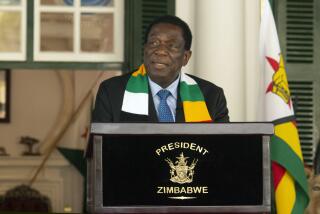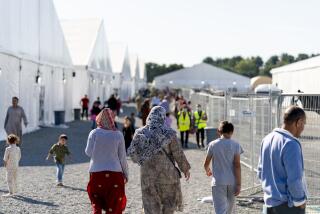Fears of Vote Buying Muddy Path to Loya Jirga
- Share via
SAROBI, Afghanistan — Faith in anything but God is hard to find in the swirling gray dust of this Afghan moonscape, especially when people feel cheated out of their voice in deciding a new constitution.
That feeling is feeding resentment in places that the U.S.-led coalition can’t afford to lose, such as Sarobi, a dirt-poor Pushtun district of about 100,000 people east of Kabul. Some here still support the Taliban and its main ally, renegade warlord Gulbuddin Hekmatyar. Others could easily follow.
Sarobi is as populous as some of Afghanistan’s smallest provinces, yet it has no delegates registered for the loya jirga, or grand assembly, that is due to begin Saturday. As in several other districts, many of the people chosen to elect Sarobi’s delegates instead voted for candidates outside their district, sparking allegations of widespread vote buying.
“If our people don’t have delegates at the loya jirga, they will never have faith in the constitution,” warned Mohammed Sangeen Tawalzalzai, a failed candidate who won the most votes, 22, four fewer than what was needed for election.
Such disputes over the election of delegates and allegations of vote buying and intimidation are undermining the loya jirga’s credibility before it even begins to debate a draft constitution that is itself the subject of heated argument.
Afghan officials have reacted quickly to try to stem fears that the constitutional process will be viewed as illegitimate. An executive committee is investigating allegations of various irregularities and interim President Hamid Karzai has ordered that any improperly elected delegates be removed, even after the assembly begins its work, said Baheen Sultan Ahmad, head of media operations for the loya jirga commission.
The committee has already rejected some delegates, including a deputy minister who is barred from sitting in the loya jirga because of his official position, Ahmad added.
The committee is also investigating “complaints of intimidation, some disorganization and also some [militia] commanders who wanted to sneak into the loya jirga,” Ahmad said. “They were rejected.”
Many electors from other areas in and around Kabul, the Afghan capital, voted for candidates outside their districts, according to several participants interviewed this week. They alleged extensive vote buying.
Kabul’s Dehsabz district, where at least 200,000 people live, also failed to get a delegate elected to the loya jirga even though it sent 51 electors to choose between just two candidates.
One of them was retired police officer Abdul Akbar Shahagha who, unlike others too frightened to speak, railed at warlords that he said stole votes from him with cash bribes to his district’s electors.
“I saw people taking money in front of everybody, in broad daylight,” Shahagha said. “I also saw people taking $50, $100, $150. I didn’t bribe anyone. Otherwise I would have been the delegate myself.”
Shahagha blamed the vote buying on warlords whom he wouldn’t name because, like many Afghans, he fears they will come after him.
“The reality is that four warlords have created the situation and circumstances in order to get voters from other districts, since they didn’t have anyone from their own to vote for them,” Shahagha charged.
The loya jirga is supposed to have 500 delegates who can debate and offer amendments to a draft constitution that proposes a powerful president and a two-chamber assembly, with some seats reserved for women.
About 16,000 electors were registered to choose 344 delegates from 32 provinces. An additional 106 seats were set aside for special groups such as women, refugees and some ethnic minorities. Karzai appoints the remaining 50 delegates, half of whom must be women.
In Kabul’s District 8 -- a neighborhood of at least 160,000 people who live along rutted dirt streets, without electricity or running water -- some claim that a mysterious Afghan American woman paid electors $300 each to vote for candidates outside their district.
District 8 sent about 78 electors, about 30 fewer than it could have, to Kabul’s Ghazi Stadium on Monday to choose between two candidates, according to two electors who requested anonymity for fear of retaliation.
The district’s full quota of electors and candidates didn’t show up, either because they were afraid or were paid not to, the two electors said.
The electoral rigging was led by two groups, the Jamiat-i-Islami of the Northern Alliance, headed by Defense Minister Mohammed Qassim Fahim, and radical Islamist Ustad Abdur Rasul Sayyaf’s faction, the men charged. The factions took most, if not all, of Kabul’s seats at the loya jirga, the men said.
Karzai, who Washington hopes will bring lasting peace to Afghanistan, didn’t buy votes the way his enemies did in an attempt to stack the loya jirga in their favor, Shahagha said. “If these delegates are in the loya jirga, they are all against Karzai, against the government of Afghanistan,” he said. “Anybody who has money is a delegate. That’s why I was not selected. I didn’t have enough money.”
Sadeq Mudaber, election manager for the loya jirga, said Thursday that he could not release a list of the elected delegates because it wasn’t complete yet.
The commission’s failure to publicize even a tentative list of delegates only feeds Afghans’ suspicions that their fates are in the hands of powerful puppet masters manipulating the loya jirga behind the scenes.
“I am from this area. I know about the feelings of the people who live in this area,” said a District 8 elector. “But the guy who has money and doesn’t know about this area never knows about the feelings of the people who live here.”
Tawalzalzai, 26, seems an ideal choice for an assembly that will create the foundation of a democracy that, it is hoped, will bring Afghanistan lasting stability after 24 years of turmoil.
He is a law student at Kabul University who was a delegate to last year’s emergency loya jirga that chose Karzai as the country’s interim president. And Tawalzalzai has deep disgust for the Taliban, the fundamentalist regime ousted in 2001. “They were terrorists,” he said.
Tawalzalzai’s closest opponent drew 13 votes, while the other received just four. Reluctant to blame corruption when he didn’t see money change hands, Tawalzalzai said unity among Sarobi’s people would have assured them a voice in the constitutional debate.
“It’s difficult to say whether people have taken money or not,” he said. “But the real problem is within our own people because we were divided in three parts. It would have been better if we had had only one candidate.
If Tawalzalzai appeals and manages to get a seat in the assembly, he will argue that the new constitution should explicitly say Afghanistan is ruled by Islamic, or Sharia, law. The current draft says only that the country’s laws should be written in accordance with principles of Islamic law, which is likely to be one of the most fiercely challenged clauses.
Tawalzalzai said Sarobi’s people were also opposed to the constitution’s broad guarantees of women’s rights. Such efforts are deeply unpopular in the conservative countryside, especially among Pushtuns, the largest ethnic group.
The rights that women are guaranteed under Islamic law, such as education and protection, are sufficient, he believes.
“It is not the right of a woman to walk on the streets without a head scarf, and she doesn’t have other rights that will have bad effects on society,” he said.
“If the constitution is approved and it contains many things that we don’t want, no one will accept it,” he added. “That’s for sure.”
More to Read
Sign up for Essential California
The most important California stories and recommendations in your inbox every morning.
You may occasionally receive promotional content from the Los Angeles Times.










